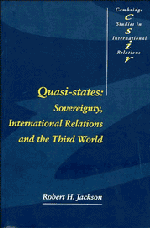Book contents
- Frontmatter
- Contents
- Acknowledgements
- INTRODUCTION
- 1 STATES AND QUASI-STATES
- 2 A NEW SOVEREIGNTY REGIME
- 3 SOVEREIGNTY REGIMES IN HISTORY
- 4 INDEPENDENCE BY RIGHT
- 5 SOVEREIGNTY AND DEVELOPMENT
- 6 SOVEREIGN RIGHTS VERSUS HUMAN RIGHTS
- 7 QUASI-STATES AND INTERNATIONAL THEORY
- CONCLUSION
- Notes
- Index
- CAMBRIDGE STUDIES IN INTERNATIONAL RELATIONS
6 - SOVEREIGN RIGHTS VERSUS HUMAN RIGHTS
Published online by Cambridge University Press: 01 June 2011
- Frontmatter
- Contents
- Acknowledgements
- INTRODUCTION
- 1 STATES AND QUASI-STATES
- 2 A NEW SOVEREIGNTY REGIME
- 3 SOVEREIGNTY REGIMES IN HISTORY
- 4 INDEPENDENCE BY RIGHT
- 5 SOVEREIGNTY AND DEVELOPMENT
- 6 SOVEREIGN RIGHTS VERSUS HUMAN RIGHTS
- 7 QUASI-STATES AND INTERNATIONAL THEORY
- CONCLUSION
- Notes
- Index
- CAMBRIDGE STUDIES IN INTERNATIONAL RELATIONS
Summary
THE UNCIVIL IMAGE OF THE THIRD WORLD
In recent decades a clearer picture of political incivility around the world has emerged. Reports of international humanitarian organizations annually catalogue arbitrary detentions, beatings, political killings, torture, terror, political prisoners, disappearances, refugees, death squads, destruction of livelihood, and various other human rights violations which fill the pages of substantial volumes. There would be more were it not for the fact that many governments conceal them. A 1986 study estimated that the world's refugee population was in excess of 13 million and that ‘the number of people displaced within their own countries is probably even greater’. Political killings either by governments or by agents which they cannot control have occurred in Guatemala, Indonesia, Cambodia, Uganda, Haiti, Argentina, India, and Libya. Political massacres with genocidal tendencies have been committed in Burundi, Rwanda, Uganda, Cambodia, and Bangladesh. Political abduction and disappearances carried out either by government agents or their opponents in 1985 alone are ‘known to have occurred’ in Angola, Argentina, Bolivia, Brazil, Central African Republic, Chile, Columbia, Cyprus, Dominican Republic, El Salvador, Ethiopia, Guatamala, Guinea, Haiti, Honduras, Indoniesia, Iran, Iraq, Lebanon, Mexico, Morocco, Nepal, Nicaragua, Paraguay, Peru, Philippines, Seychelles, South Africa, Sri Lanka, Syria, Togo, Uganda, Uruguay, Vietnam, and Zaire. The use of torture as part of state controlled machinery to suppress dissent has been documented recently in sixty-six countries: twenty-three African (including South Africa), fifteen Latin American, ten Middle Eastern, ten Asian, and eight European.
- Type
- Chapter
- Information
- Quasi-StatesSovereignty, International Relations and the Third World, pp. 139 - 163Publisher: Cambridge University PressPrint publication year: 1991



